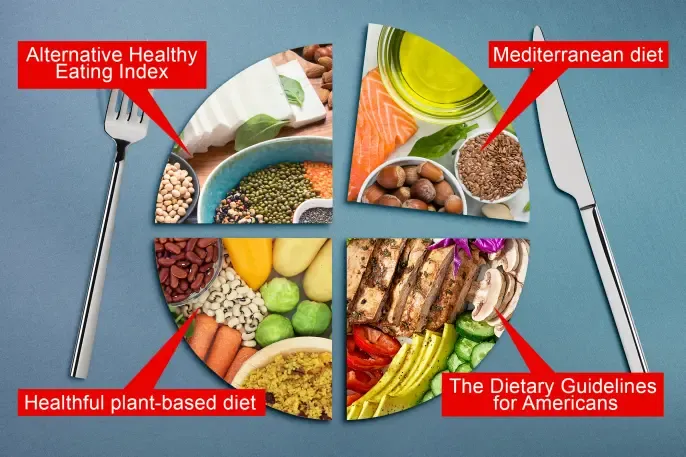(New York Post) Good news for those whose New Year’s resolution is to eat healthy — you’ve got options.
Researchers from Harvard University have identified four common healthy eating patterns that can help reduce the risk of an early death by up to 20%.
A new study published in the journal JAMA Internal Medicineaimed to find any links between the Dietary Guidelines for Americans, as outlined by the US Departments of Agriculture and Health and Human Services, and premature death from disease.
Dr. Frank Hu, professor and chair of Harvard’s Department of Nutrition, said in a statement that their findings on the health effects of US dietary guidelines are the most in-depth to date.
“It is critical to examine the associations between DGAs-recommended dietary patterns and long-term health outcomes, especially mortality,” Hu said.
Hu’s team analyzed four healthy eating styles — all of which emphasize whole grains, fruits, vegetables, nuts and legumes — seen frequently in the US: the Mediterranean diet, a balanced plant-based diet, a traditional healthy diet based on the the Dietary Guidelines for Americans and Harvard’s own amalgamation of nutritional metrics called the Alternate Healthy Eating Index.
The Dietary Guidelines for Americans, as well as any of the three alternative diets, were associated with a lower risk of death. People who stuck to any of the four healthy eating patterns were less likely to die from cancer, cardiovascular illness, and respiratory and neurodegenerative disease.
The study followed 75,000 women participating in the Nurses’ Health Study and more than 44,000 men in the Health Professionals Follow-Up Study, two cohorts of survey respondents compiled by Harvard, over 36 years.
Participants were scored on indexes that measured how closely they followed each eating style, according to self-reported questionnaires provided every four years. None had been diagnosed with cardiovascular disease at the time they started the study and few were smokers.
Participants who changed their diets by making it 25% healthier — by integrating just one of the healthy eating plans into their lives — could potentially reduce the risk of dying from cancer by 7% to 18%, cardiovascular disease by 6% to 13%, respiratory disease by 35% to 46% and neurodegenerative disease by 7%.
Hu hopes his findings will reassure those who are easily bored by strict diets. “It means that we have a lot of flexibility in terms of creating our own healthy dietary patterns that can be tailored to individual food preferences, health conditions and cultures,” he told CNN on Monday.
Here’s more on Harvard’s four favorite healthy eating plans.
 Researchers from Harvard University wanted to test if there was any relation between the recommended dietary guidelines and cause-specific mortality.Getty Images
Researchers from Harvard University wanted to test if there was any relation between the recommended dietary guidelines and cause-specific mortality.Getty Images
Mediterranean diet
The Mediterranean diet — which was named the 2023 best diet overall for the sixth year in a row by U.S. News & World Report — stresses the importance of quality sourcing and filling your plate with nutrient-rich whole foods and grains, with an emphasis on fresh produce, lean protein, such as fish and chicken, and, of course, antioxidant-rich olive oil.
The Med diet derives from the traditional diets of 21 countries that border the Mediterranean Sea, including Italy, Greece, Croatia, Turkey and Monaco — where fresh greens, fruits, fish, nuts and olives abound.
The Mediterranean diet is known to lower the risk of cardiovascular disease and other chronic conditions, according to previous research.
One recent study found that the “green” Mediterranean diet, which cuts out the animal protein, helps burn fat three times faster than typical healthy eating. The risk of death was reduced by 18% for those who followed the Mediterranean diet.
 A new study found that four healthy eating patterns can help reduce risk of an early death by nearly 20%.Getty Images
A new study found that four healthy eating patterns can help reduce risk of an early death by nearly 20%.Getty Images
Healthful plant-based diet
The healthful plant-based diet is similar to the Mediterranean diet in that it focuses on eating more plant products but eliminates animal products, including cheese. For the Harvard study, researchers also docked points in this category for consuming alcohol, as well as “unhealthy” versions of plant-based foods, such as breaded and fried veggies.
The plant-based diet index “even discourages relatively healthy options, like fish or some dairy products,” Hu told CNN — suggesting that strict plant-based eaters could be missing out.
That said, going vegan reduced mortality risk by 14%.







